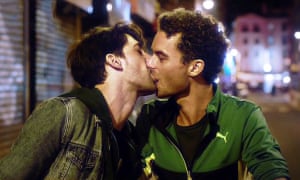Moonlight UK -Can Gay Sex in A Movie be Less in$$ than Straight Sex and Why?
I wrote a big introduction to this article by Guy Lodge and posted on The Guardian but I scrapped it. Gay sex on the movies it’s a subject in which I feel there is too much hypocrisy from the so called straight world. Studies done show movie makers can make more money if they don’t show gay scene a la straight mode; In other words show the parts or the rendition of the mechanism of love making between two guys. I have a thesis for that but is not backed up by any study I’m aware of and it could be bias in my part so I will just show you this article that appeared on the Guardian UK. I think it does some justice to this theme.
_*_
Nearly one year ago, as Oscar voters were weathering a second straight year of criticism for the lack of diversity among their nominees, the notion of a film like Moonlight emerging as an Oscar frontrunner might have seemed fanciful. The Academy may not be unremittingly allergic to stories of contemporary black lives – Precious and Boyz N the Hood cracked their radar – just as they haven’t always been entirely blind to LGBT narratives. But neither is among their, shall we say, areas of expertise, and in a year where even the reserved, elegantly upholstered white lesbianism of Todd Haynes’s Carol proved too discomfiting for a best-picture nomination, you wouldn’t have bet the house on a coming-out story centred on a disenfranchised African-American man in contemporary Miami
Yet, as we head into the climax of awards season, Barry Jenkins’s film is shaping up to be a sure Oscar nominee in the top-tier categories, and the chief opposition to Damien Chazelle’s presumed field-leader La La Land. Not since Ang Lee’s Brokeback Mountain was famously and infuriatingly beaten to the gong by that everyone’s-a-little-bit-racist sermon Crash has gay cinema had quite such an optimistic shot at the industry’s top honour. And while $12.8m (£10.4m) is a modest number in the grand scheme of things, it’s an extraordinary gross for a film of its particular demographic focus – an encapsulation of multiple interests not accounted for in Donald Trump’s America.
_*_
Nearly one year ago, as Oscar voters were weathering a second straight year of criticism for the lack of diversity among their nominees, the notion of a film like Moonlight emerging as an Oscar frontrunner might have seemed fanciful. The Academy may not be unremittingly allergic to stories of contemporary black lives – Precious and Boyz N the Hood cracked their radar – just as they haven’t always been entirely blind to LGBT narratives. But neither is among their, shall we say, areas of expertise, and in a year where even the reserved, elegantly upholstered white lesbianism of Todd Haynes’s Carol proved too discomfiting for a best-picture nomination, you wouldn’t have bet the house on a coming-out story centred on a disenfranchised African-American man in contemporary Miami
Yet, as we head into the climax of awards season, Barry Jenkins’s film is shaping up to be a sure Oscar nominee in the top-tier categories, and the chief opposition to Damien Chazelle’s presumed field-leader La La Land. Not since Ang Lee’s Brokeback Mountain was famously and infuriatingly beaten to the gong by that everyone’s-a-little-bit-racist sermon Crash has gay cinema had quite such an optimistic shot at the industry’s top honour. And while $12.8m (£10.4m) is a modest number in the grand scheme of things, it’s an extraordinary gross for a film of its particular demographic focus – an encapsulation of multiple interests not accounted for in Donald Trump’s America.
However, as Moonlight gains in momentum and cultural currency, there’s a danger in piling too much symbolic weight on its unapologetically slender shoulders: it’s an intimate character study, not an all-encompassing social dissertation. Nor should it be heralded as some kind of flag-bearer for new queer cinema, heartening as its mainstream success is for the movement. Because although the film’s depiction of emerging alternative sexuality may be beautifully articulated and modulated, there’s a level of cautiousness that has enabled its broader acceptance thus far: it’s a gay romance with no on-screen sexual activity beyond an unseen handjob. That may be an apt level of extremity for a story hinged on repression, but it’s hard to imagine an equally accomplished, more explicit study of down-low sexuality among African-American men garnering quite as much popular acclaim. Meanwhile, Dee Rees’s marvellous 2011 film Pariah, a story of a teenage African-American lesbian’s self-acceptance that bears thematic and stylistic comparison to Moonlight in many respects, could only have dreamed of this red-carpet rollout.
Jenkins, who is straight, has spoken of his trepidation over steering an LGBT narrative: “I think there are some stories that can only be told from a first-person perspective,” he told Vulture. “[But] if there’s ever going to be a space where I can truly empathise with a character who has a core aspect of his identity that I don’t share, it’s going to be this case.” That empathy, the potential to recognise of one’s own needling social non-conformities in those of others, is what Moonlight’s makers and publicists have, wisely, talked up from the beginning. The Paris Review typified the approach of many critics in labelling it “everybody’s protest film”.
Of course, there is both room and need in queer cinema for films that universalise the experience of homosexuality as well as ones that explicitly localise it. As more LGBT-themed works reach cinemas than ever before, the most exciting possibility is that queer film may develop its own increasingly wide mainstream-to-niche spectrum, rather than occupying a single specialised corner of the arthouse. If Matthew Warchus’s rousing, upbeat Pride – shown on British TV over the Christmas break – is currently a go-to option as a progressive gay film you can safely watch with your gran, perhaps future years will appoint an Oscar-gilded Moonlight as gateway viewing for curious viewers into more esoteric and/or erotic portraits of homosexuality.
At present, while claims of a golden age of queer cinema may seem too idealistic, the menu is a healthily broad one, with non-English-speaking filmmakers leading the charge most adventurously. The French, unsurprisingly, treat frank queer sexuality on screen with a casual shrug. Alain Guiraudie’s unique quasi-Hitchcockian thriller Stranger By the Lake, which sets a serial killer on the loose in a bucolic cruising ground of freely rutting men’s bodies and calmly gazes upon the hot, nasty fallout, was not just a substantial hit, but was amply recognised in the country’s Oscar-equivalent César awards; no film of remotely comparable gay content has ever passed the Academy barrier. (Guiraudie’s eccentric follow-up, Staying Vertical hits UK cinemas this year and is equally fearless: without straying too far into spoiler territory, it has perhaps the most lethal scene of gay anal intercourse ever put on screen.)
Last year’s most eye-opening queer release was Olivier Ducastel and Jacques Martineau’s Theo and Hugo, which opens with an 18-minute gay orgy in a Paris sex club, before its title characters introduce themselves and woo each other, Before Sunrise-style, across a night of walking, talking and one panicked HIV clinic drop-in. Achieving a tender romanticism in a manner that seems thoroughly infeasible during its hardcore opening salvo, it’s a film with little interest in making the gay experience accessible or palatable to audiences of all stripes; at the screening I attended, the walkouts during the first few minutes, by viewers who may well have warmed to the film’s ensuing, fully clothed love story, were numerous. It’s rare for a film to portray the urban realities of gay sex, dating and Grindr culture this candidly and cheerfully; it’s tempting to view the film as a litmus test for the extent of straight viewers’ empathy.
Across the globe, Park Chan-wook, not a gay or even expressly queer filmmaker, but an all-purpose connoisseur of kink, has been lavished with US critics’ awards (and robust arthouse box office) for The Handmaiden, a sly, sinuous and unabashedly sexy reinvention of Sarah Waters’ bestseller Fingersmith, relocating that yarn of Victorian lesbian skulduggery to Japanese-occupied Korea and adding a number of its own fetishistic fixations with bondage and antique erotica. It’s grandly entertaining, artfully lurid stuff, and not remotely shy of its own horniest impulses: Park’s fascination with bodies, and how we pleasure and abuse them, gets an acrobatic workout here.
Unsurprisingly, he has taken flak in certain critical quarters for offering a straight male gaze on intimate lesbian activity; empathy, in the sense that Jenkins describes in the aforementioned interview, is not heavily on The Handmaiden’s mind, although such jabs glide over Park’s recurring identification with otherness and perversion in his cinema.
Straight French filmmaker Abdellatif Kechiche faced similar pushback – from Steven Spielberg no less – over the extended, undeniably arousing lesbian sex sequences in 2013’s closeup coming-out epic Blue Is the Warmest Colour, which broke out of the queer market to become an across-the-board art house conversation piece after landing the Palme d’Or at Cannes.
The line between praising non-LGBT filmmakers for placing a sympathetic lens on queer lives and accusing them of exploitation can be a fine one, played out in a series of backlashes and counter-backlashes. Meanwhile, a respectfully restrained approach can find itself in hot water, too. Straight filmmaker Ang Lee was taken to task by many queer critics for playing Brokeback Mountain’s key scene of campsite sodomy too gingerly; Todd Haynes, while among the most forthrightly queer American filmmakers of his generation, was thought by some to have emphasised more caution than lust in Carol’s heavy-breathing but tastefully blocked sex scenes. Both films saw their tact (and, of course, their ample artistic merits) rewarded with major releases and prominent publicity, just as Moonlight has done; with a £145m worldwide box office, Lee’s film stands as the highest-grossing gay drama of all time.
Of course, you could argue that mainstream cinema has become more averse to sex of all persuasions; even the much-ballyhooed straight erotica of Fifty Shades of Grey had a few more buttons done up than it would have done in the days when Basic Instinct was a blockbuster. Uninhibited visions of queer sexuality in the multiplex may be many decades off, if even a prospect. But interest, awareness and, yes, empathy among general audiences is growing and should continue to do so as predominantly liberal Hollywood finds ways to assert itself under Trump rule. (The prospect of a boyfriend for glibly blokey but supposedly pansexual superhero Deadpool in the upcoming sequel, as repeatedly teased by star Ryan Reynolds, may not be treated as the most sincere of gestures by gay audiences.) Still, if the Academy and the major studios keep meeting queer cinema in the middle, we may be pleasantly surprised by what a little Moonlight can do.
• Moonlight opens in the UK on 17 February and The Handmaiden on 14 April


Comments